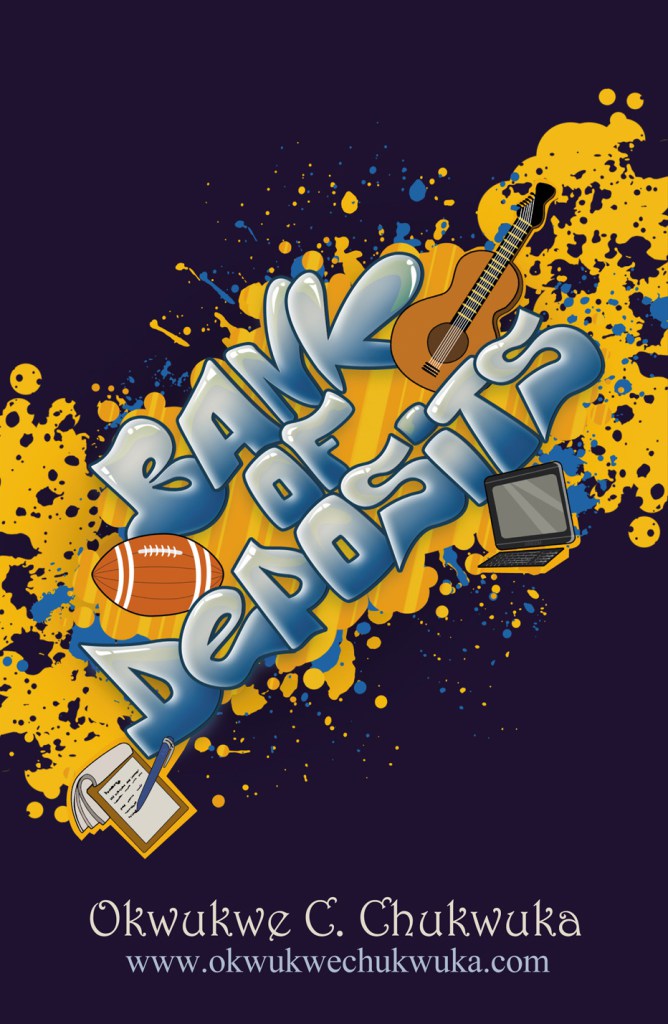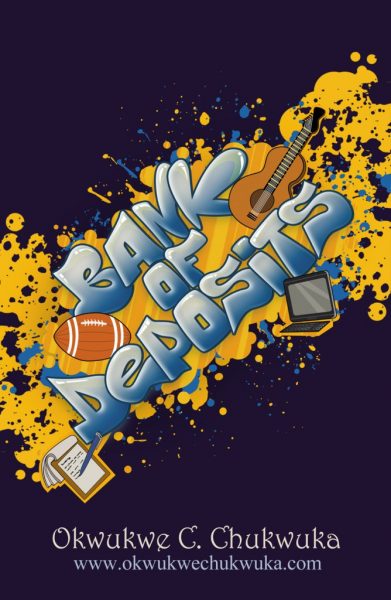By Okwukwe Chukwuka
House of Specuit, 2016
ISBN: 978-978-951-687-2
Every human being can be likened to a bank with a deposit of talents. Thus, the success or failure of each human bank is determined by how the resources are put to use. Okwukwe describes from personal and practical experiences in witty writings, the journey of discovering and harnessing the human talent to gain success.
Bank of Deposits consists of 76 episodes in 10 sections. In the first section, In Search of My Identity, the author describes his self-discovery and how it was shaped by family, friends and teachers. Though by the age of twelve he found out his passion for writing, Okwukwe, like most others finds himself stuck in the dilemma of choosing a suitable course of study as a teenager and finally moves to the university to study Economics. His experience is akin to Aesop’s story of the fox and the cat that he retells in section 10, Analysis Paralysis; having many things he felt he could do, he failed to stick to the passion he had earlier discovered. In this section, he describes how people are crippled by the idea of having all details of their life right before they can act. By making excuses like “… Nigeria is so tough…”, “I’ll pursue my passion when I’m old enough”, or “My parents won’t allow me pursue my passion”, people finally end up doing nothing with their talents, in order to please the society or blend in with the status quo.
The question of what talent is (or what it is not) and how to harness it, is answered in the sections between the first and the last in such a way that either a teenager or an adult can understand. In section 2, The Biography of Talent, the word is explained from its usage in past ages to how it is used today in terms of being a special natural ability given by the Creator to humans. He explains further that we can develop a new passion in response to challenges, hence, there are environmentally inspired passions that cause us to respond by creating solutions to problems.
The next section, Why You Should Never Hype This Talent Ish, unravels the ideas that surround talent and how talent can be influenced by the environment, temperaments and the era we find ourselves in. Here, the writer gives a talent checklist of 16 preconceived notions on the word talent. Many people are led to the misconception that a talented person does not a basic education, or that talent is a birthright to success, or that talent on its own is enough. However, this book explains why a basic traditional education is important for the development of talents, why talent cannot guarantee success and why like money, talent has no intrinsic worth of its own. If one cannot use talent to affect lives, it has no value. Two of these notions, ‘Talents have Categories’ and the ‘Business of Talent,’ form a platform for preceding sections.
Maybe You Are Selectively Weak/Lazy: Differently Intelligent could be a confusing subtitle for a section that simply defines how talents/intelligence are classified. I highly recommend that anyone finding it difficult to understand he/she fits in pick this book even if it’s for this section only. Based Howard Gardner’s classification of intelligence into spatial, verbal-linguistic, logical-mathematical, bodily-kinaesthetic, musical, interpersonal and naturalistic categories. Like the saying goes “Everybody is a genius. But if you judge a fish by its ability to climb a tree, it will live its whole life believing that it is stupid.” To maximize your potential, you have to discover your niche.
Though section 7 is subtitled The Business of Talent, I believe the title generally encompasses sections 5 to 9. Since our lives can be defined as our own personal business, we all need to apply a SWOT analysis to it. SWOT It Out, section 5, explains the importance of creating a SWOT list to help in getting some level of control over our lives instead of having life dictate where a person has to go at any point in time. This calls for being proactive with our lives by building our strengths, minimizing our weaknesses, taking advantage of the opportunities that come our way and opposing/defying our threats. If you read this book through the eyes of being your own manager, you’ll understand that The Stages of Talent Management involve the routine checks we have to do in our businesses: discovery, preparation, practical application and actualization/the process of achieving. In the author’s words, “the business of talent abhors perfection; it is a progressive entity and enterprise.” This means that one has to harness talent in order to get better at it. However, care should be given to career choices, which are tools for harnessing our talents, but often suffer manipulation by loved ones or the media.
After a SWOT analysis, the next major line of action hinges on the question Do You Have A Talent Blueprint? This section illustrates creating a plan through setting a vision, a mission statement, a set of goals and activities to achieve desired results.
Finally, Talent Management is a Continuum. What contributes to success is the discipline to be consistent in the things that ought to be done every day, how much investment one puts in a passion, a network of positive human relationships, finding innovative ways of doing things, and prayer.
I found this book a helpful guide and wished I had read it years before it was written. Pick it up with the intention of reading and applying the principles to your life. Copies are available at Terra Kulture- Victoria Island Lagos, Konga.com and Specuit Cargo, and an excerpt is available on okadabooks.com.


